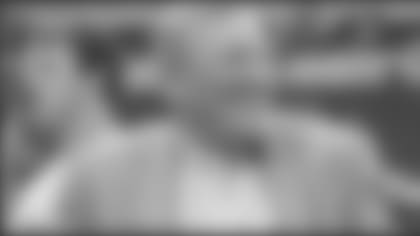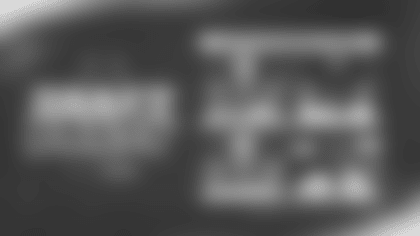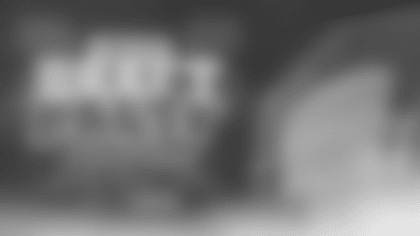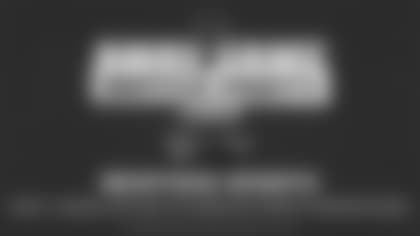**
**
*Q: Can you just discuss the Colts' approach to the final two weeks, particularly Sunday's game against the New York Jets?
*A: You do want to win every time you take the field. There is a lot of misinformation floating around about how to approach it and how we should approach it. Every time you go out on the field you want to win, whether it's a scrimmage, whether it's a preseason game, whether it's a regular season game. Whether it has meaning in the standings or not, you always want to win. Everybody plays to win. We've done that on numerous occasions in the past, most notably a couple of years ago against Arizona here in a very exciting finish. That part of it is a given, and people should not think that no matter who is playing that we don't care about winning the game. We do, greatly. In professional football and professional athletics of any kind, if you're going to play, you better go out there and give it 100 percent. Otherwise, you run a very, very serious risk of injury. So, whoever is going to play has to be ready to go 100 percent physically and emotionally. Now, that said, we have issues that have to be determined and that are yet to be determined as to who can play and who can't physically. Because of the situation where the game doesn't count in the standings, you then apply a different medical barometer than you would if the game had playoff implications. Basically, players who have been playing hurt who can use the rest get the rest. I don't think it will go much beyond that. That's our only concern. Everybody else has to get ready to play and go 100 percent, and we want to win the game.
Q: You often hear the phrase, "game-day decision." It really came down to that on Thursday with DT- Eric Foster . . .
A: We did not know. He warmed up. The doctors took a look, conversed with him and decided he was OK to go. That was about an hour and thirty-five minutes before game time, which is five minutes before you have to put in the roster. We decided to put Eric out there, and he had a great game: two sacks, a caused fumble, which is usually the way. He had a very sore back and was very questionable to go. I think that same thing will hold true here. We'll go all the way to Friday, I'm sure, before we finalize what plans we're going to make in terms of who can play and who can't. Obviously, we're always structuring as the week goes on, but there are so many questions to be answered as the week goes on I'm sure it will be Friday before we have an idea exactly where we are.
Q: Does the Jets' playoff situation change anything about your thinking?
A: No. It does not. Whatever our opponents' concerns are are their concerns. We're concerned with our own ballclub. That's our only concern throughout the year and that's all it has to be. We've earned the right to be in the position we're in, and that's all there is to it.
Q: And while 16-0 would look great, a Super Bowl trophy would look better.
A: Yes. Sixteen and oh is not a goal. It's not something that anyone here starts the year saying, 'We want to be 16-0.' We realize in many cases – in the vast majority of the cases – it's unrealistic. It has been done before. In terms of records, I think we've set every record that we can this season. It has been wonderful. It's great and it ought to be celebrated. But 16-0 is not an issue for us. I've said many times before, 'It's perfectly fine for fans and for media and others to have their issues and view the world as they view it.' That's what makes the world go around. It's fun. People talk about it, and that's a good thing. But our issues are not necessarily other people's issues, and 16-0 is not our issue.
Q: Do individual goals come into play?
A: Very peripherally. Most of what was achievable we achieved Thursday night. I don't think (WR) Reggie (Wayne)'s thing is realistic to be truthful with you. (Tight end) Dallas (Clark), you would hope he would get the three yards (receiving) somewhere along the line. The 11 catches to 100 is probably pretty tough to get. It has been a phenomenal year for Dallas no matter how you slice it. I don't think there's anything else out there that would be of any great consequence.
Q: Quarterback Peyton Manning needs 160 yards passing to get to 50,000 for his career.
A: He'll get that at some point. There's nothing pressing in these next two games. That's not a seasonal issue. It's an issue for the long term. He'll get 160 yards somewhere.
Q: Do you prepare any differently for these final two games?
A: Not one iota. (Former Head Coach) Tony (Dungy) coined the phrase, 'Just do what we do.' We live by that. We're going to continue to practice exactly the way we practiced all season. We're going to continue to prepare the way we've prepared all season. We'll continue to structure the roster the way we have all season. Nothing will change in that regard, and nothing will change in the way we play the game. The only thing is if people aren't healthy, they won't play. It's that simple.
Q: Any less stress on you as a general manager?
A: Everyone is focused on the playoffs. This is a situation where in terms of structure and what we do on the personnel side we're thinking ahead, which is not something we normally do, but this forces you to do, obviously. We're going to deal with that and we'll deal with it accordingly, but in terms of structuring the roster, the only think that changes this week and next week, as opposed to a normal game week, is we try to structure on Wednesday so that we pretty much know what the roster is going to look like on Sunday. Now every week, there are almost always game-time decisions. This week will probably be a bit more flux because there isn't that pressure on Wednesday to know exactly who's going to play. You can work in practice and still get people reps. You've probably got a little later in the week to decide before we rule anybody in or out. But other than that, it's business as usual.
Q: Regarding Curtis Painter, the backup quarterback, if you were going to play him in a game, how early would you tell him?
A: You'd tell him no later than Friday. (Colts Head Coach) Jim (Caldwell) might give him a heads up and say, 'Be ready,' but he's the backup quarterback now, so he has to be ready anyway. It's not like he's No. 3. Jim Sorgi's down. Curtis has to be ready, period.
Q: Would you ever consider using a first-round draft selection on a big-time returner?
A: It would depend entirely upon what else was there. If there was a great dual returner – he would have to return both punts and kicks – and there was nothing else there that was a premium player, sure. Our objective with the draft is always to take the best football player – not necessarily what people think our need may be or who they think is the hottest player or things of that nature. We go for the best players. Most people thought we made a mistake when we took a so-called undersized defensive end named Dwight Freeney. So, the answer is, 'Yes, if he's a good enough player.' It proves you take the best player.
Q: The final games are without playoff implications, but would they decide – based on regular-season record – the home team for the Super Bowl?
A: No, it does not. Once you clinch your seeding position in the playoffs, whatever that may be, everything else is frozen at that point. The only thing the Super Bowl affects is your draft position. Right now, the teams would be ranked – once the teams were seeded – 1 through 32 in terms of their regular-season record. That would change within the playoff participants depending upon how early or late you go out of the playoffs. The winner of the Super Bowl drafts 32nd. The loser of the Super Bowl drafts 31st. And so on, up to 20th. Positions No. 20-32 in the draft are determined by results of the playoffs. Everything freezes at the end of the regular season.
Q: Did DE-Dwight Freeney and DE-Robert Mathis playing sparingly hurt the Colts defensively on Thursday?
A: The Freeney-Mathis issue is one issue, but only a small part, because they were going to play in third-down-and-long situations. Jacksonville actually constructed its game plan in a very smart way, as it usually does. They came in with a heavy package featuring two tight ends and six offensive linemen, and they were going to batter away. Here's why that was a good thought: it was a Thursday night game. The human body was not made to play football twice during five days. At least not professionally. So, in those Thursday night games – and I'll refer you to the Giants-Broncos game on Thanksgiving – the visiting team particularly is at a very big disadvantage. A, they have to travel, so it's one less day of treatment and recovery you get. B, both defenses are beat up and tired anyway. It's the defenses that don't recover in that short-week situation. Those games tend to be high-scoring, wild-and-woolly affairs. What was interesting about the game was we hit so hard that, even though they were making yardage, in the second half (Jaguars running back Maurice) Jones-Drew – as great as he is – slowed down. Now, you would expect that – he had a heavy workload against Miami in a slam-bam game (the previous week) and then had a heavy workload against us in a slam-bam game, but we put some licks on him. Our guys hustled around and hit hard. We gave up some yardage, but we gave as good as we got. They got no big plays in the running game and as long as that happens, you're OK. You're in pretty good shape. But the Thursday night game is a very big hardship for the visiting team, and it's most hard for the visiting defense.
Q: In 14 games this season, the Colts' opponents have run 70 or more plays seven times . .
A: That's part of the problem having an offense such as we do that scores pretty quickly. As a result, the defense is on the field for a longer period of time. We built that into the roster management part of it, but again on a short week – and that's not a short week, that's an invisible week, two days preparation and three days rest – it's very hard to get them fresh enough to where they can do anything but gut it out. And gut it out they did.
Q: In a sense, it didn't help the defense that Chad Simpson ran a kickoff back for a touchdown in the first half. That put the defense right back on the field . . .
A: The defense had to go right back on the field again. We'll take the seven points, but the fact is our defense has to play a lot anyway, because we do score quickly. There are teams who choose to run the ball almost exclusively, with the idea that they're going to limit the number of possessions we have because they'll pound and pound and go for it on fourth down, etc. In almost every case – in each of the last 23 cases – we've won the game in that situation, but it keeps the defense out there for a long time and ultimately, over the course of the season, they tend to get worn down.
Q: How would you feel about going against New Orleans in the Super Bowl?
A: I have not studied New Orleans on tape. I did watch the game the other night against Dallas. We were impressed with them when we played them in the preseason a couple of years ago. You could see they were developing the nucleus of what was going to be a very good team. We have to worry about first things first, and probably the principal reason we are where we are today and having this discussion about who to play and who to rest is because we have focused only on the upcoming game. Throughout the entire season and throughout the entire 23-game winning streak, we have focused on the upcoming opponent and shut out everything else. That is the only way to succeed in this league. All of the other things are fine. They're great to talk about. They're great to write about. They're great to ruminate upon, but in the end, for the people who are doing the playing and the coaching and structuring the roster and putting the team on the field, it's absolutely paramount to concentrate only on the next opponent. I take my hat off to New Orleans. Obviously, they're having a great year, but we need to be worried only about the New York Jets.
Q: Is there a possibility that, considering the ramifications on the salary cap, S-Bob Sanders could be released in the offseason.
A: First of all, it's entirely possible that if there is no labor agreement between now and March 5, that there will be an uncapped year. So, there will be new rules that apply. It would take me all night to give you the whole digest of rules, but the most obvious one is that players who otherwise would have been unrestricted free agents will be restricted free agents. That means the old club has a right of first refusal on those players, so you could keep them or get draft-choice compensation if someone else were to put an offer sheet on them. That's a marked change from the way business has been done in the National Football League for the last 15 years. As for Bob, there is no reason – salary cap or otherwise – to let him go. He's back here for the holidays. He's been in Florida assiduously rehabilitating both his arm and his knee. He just had some tough luck. He's a game-changing player. By the way, (Steelers safety) Troy Polamalu has had some tough luck. Those guys are some of the most explosive guys in the game and they have had some tough luck, but there's absolutely no reason to think about letting him go. In fact, we're eagerly awaiting his return. He'll be back hale and hearty next year, and we look forward to having him back out there on the field.
Q: And you knew S-Melvin Bullitt could step in and do the job he has done . . .
A: We certainly did know about Melvin and anticipated he would play very well. No one is quite Bob. He's unique, but Melvin has stepped in and done a wonderful job, as has Antoine Bethea. We're fortunate to have that kind of depth and that kind of character, and that's one of the reasons we are where we are.
Q: Can you comment on Chris Polian being promoted to Vice President/General Manager and how often do teams come after Colts personnel people?
A: Chris, No. 1, wanted very much to stay here. (Colts Owner and Chief Executive Officer) Jim Irsay wanted that, too, and they worked it out. There's no question that had he chosen to go elsewhere he would have had other opportunities. But he did want to stay here, and I'm glad he did. In terms of our scouting department, we've lost a couple of guys to promotions over the last couple of years, most notably David Caldwell, who was our West-of-the-Mississippi regional supervisor. He took the next step up and became the director of college scouting for the Atlanta Falcons. Tom Gamble left to become the personnel director for the San Francisco 49ers. Paul Roell left to become the regional supervisor of the Minnesota Vikings, so we've lost our share of people. But we also attract good people and through our internship program, we've been able to replace people who have left. Every one of those people who have left is part of all of these great accomplishments and while I hate to see them leave, I'm very happy to see them advance in their careers. (Hall of Fame Head Coach) Marv Levy once told a story that Bear Bryant told him. Bear Bryant told him he'd lost 128 assistants to head coaching jobs over the course of his long career. He was very proud of that and what it meant was that good people wanted to come to work for him. We've been fortunate that although we've lost some great people, other good people have wanted to work here. So, that's a good thing.
Q: Do you ever go outside the Colts' organization and seek advice?
A: Yes. Absolutely we do. We've done a lot of consulting work along those lines with Major League Baseball teams, with National Hockey League teams and with people I have great respect for at the collegiate level. We do it as a matter of course and it's very instructive and in many cases, gives us terrific ideas we can implement. We also attend as many high-level off-season seminars as we can. Most of us end up being panelists, but they're fun to attend and hear what other people have to say. The short answer is yes, we do all of the above and more. We try to be as wide-ranging in terms of the bases that we touch outside of our organization as we can. We've shared ideas with any number of people, but it's always more valuable for us. Major League Baseball is a prime example. There was an article written about that in one of the Boston papers recently. You come from different sports and different ways of doing things, but the objective is always the same: to put the best players on the field that you can. It's interesting to see how other people approach it. It's also true of the game operations side, the business side.
Q: One trait that's always noticeable about this team is it's ability to focus . . .
A: Our focus really is on playing as well as we can play against the next opponent, whoever that may be. In this case, it happens to be the Jets. That has served us well for 23 straight games. Then, after that, our focus will be on playing whomever we get in the second round of the playoffs. That's the way we've approached things. I know that sounds strange if you're not in this building and you're not in this business, but the only way to achieve anything meaningful in this business is to focus on the immediate moment, because that's the only thing you can control. You can't control anything that goes on outside of that. You can't control what other teams do. The only thing you can control is what you do. It takes a great deal of maturity and a great deal of experience and a great deal of wisdom to realize that. Fortunately, Jim Caldwell has done a tremendous job of reinforcing that continually with our team. We start from Day One of minicamp with the idea we're going to focus on the immediate target at hand and we'll worry about all of the other stuff later. We have a saying, which we all got from (Penn State Head Coach) Joe Paterno: 'Take care of the little things and the big things will take care of themselves.' We've concentrated on the little things, and that's what we'll continue to do. Our focus isn't on the last game. Our focus is on the next game, whomever that may be against.
Q: Where does that come from?
A: The vast majority of it is coaching. The second part of it is veteran leadership, guys who say, 'Listen to one voice. Listen to Coach Caldwell. Listen to what he tells you.' The third part is organizational culture. As an organization, we accept the fact that it's, 'Next Man Up,' that it's, 'Take Care of the Little Things and the Big Things Take Care of Themselves,' that the next opponent is the most important opponent, and the only opponent. All of those things, to one degree or another, make up that mindset, but the vast, vast majority of it is coaching.
Q: Can you update the status of WR-Anthony Gonzalez?
A: He practiced [Monday] and it seemed to go OK. Now, today was just a light workout – typical Monday workout where we try to concentrate on some mistakes we made in the previous game – but he did practice and seemed to go through it fine. In fact, I know he went through it fine, because he stayed out afterward and did some extra work with some other receivers. He'll practice fully on Wednesday. That should tell the tale. We'll see how he comes in on Thursday. I would say he's an end-of-the-week, game-time decision. He would like to get on the field, and we would like to get him on the field for as many snaps as we can if we can do that on Sunday. That's a question that will be answered later in the week.
Q: Can you update the status of CB-Jerraud Powers and K-Adam Vinatieri? And if Vinatieri's not able to come back, how fortunate are the Colts to have a veteran such as Matt Stover?
A: Matt Stover has been just a Godsend for us. He's been terrific. Adam will kick later this week and as we get later in the week, we'll get a better feel for whether or not he's ready to go. I think he would like to. What his body tells him is another story. We'll see how that goes. Jerraud will be out this week and likely next. There's no indication whatsoever that he won't be back for the playoff game. In fact, he'll likely have the two full weeks of practice and be ready to go for the playoff game. It's just a little bump in the road and truthfully, the rest is probably a good thing for him. He played a lot of snaps for a young player. He's raring to go. We'll see how he responds as the week goes on, but I would be fairly certain that he's at least questionable for next week, but we fully expect he'll back for the playoff game.
Q: In several games, the defensive backs tend to play off receivers and not take advantage of the five-yard bump-and-run. Why is that? Is that a scheme of the defense?
A: Yes, it is. We will play various different styles and techniques in the defensive backfield. There are times we will play up close in a bump-and-run fashion. There are times we will play backed off. There are times we will play man-to-man. There are times we will play zone. The idea is to disguise exactly what you're going to do so that the opposition doesn't have a feel for what they're seeing from you. When a player is playing backed off in zone, for example, and they throw a short pass underneath and he comes up and makes the tackle, people get annoyed that the tackle has been made and the pass hasn't been broken up. The bottom line when you're playing zone defense, for example, is you may be willing to give up a short pass in order to prevent a deeper one. It's all a question of what technique is being used, and it's all a question of what the defensive call is. For example, on Sunday in the Pittsburgh game, (Steelers quarterback Ben) Roethlisberger made an incredible throw at the end of the game and a very good catch on the part of the Pittsburgh receiver to win the game. There was a lot of conjecture about whether or not they should have double-teamed that player. You don't know what occurred unless you know what the defensive call is. So, oftentimes even I will have to wait until after the game and say to the coaches, 'What coverage were we in here? Did so-and-so make a mistake, or was he in the right place and the other team just made a play?' It's very difficult because of the disguising to recognize from afar on game day exactly what the coverage is.
Q: Talk about the Jets for a moment. They run the ball very well . . .
A: Do they run the ball. They have Thomas Jones averaging 4.3-yards-per-carry. Shawn Green, a rookie from Iowa, is averaging 4.8 yards a carry and Leon Washington is averaging 4.6 yards a carry, to say nothing of setting the world on fire as a kick returner. This is a three-headed running monster, which I'm sure we'll see plenty of, because a rookie quarterback, Mark Sanchez – who's going to be a very fine quarterback – is going through the same kinds of struggles that Peyton had when he was a rookie. They rely very, very heavily on running the ball, and I'm sure they will continue to do that. On defense, it's a whole other story. This is a Rex Ryan-coached team. It's the same defensive scheme that he bedeviled us with in Baltimore. It's blitzing from everywhere, including the locker room and the scoreboards, it seems, from time to time. They have a number of really good players – (defensive end Shaun) Ellis; (Calvin) Pace, the great linebacker; (linebacker David) Harris; Jimmy Leonhard, who is their spark-plug safety; but the key guy is Darrelle Revis, who I'm sure is a starter in the Pro Bowl. He's as good a corner as there is in the league. I would suspect the AFC corners would be he and Champ Bailey (of the Broncos). That's a handful for anybody. Their struggles with a rookie quarterback, and some special teams miscues, have been largely responsible for the fact that they're 7-7. They're still very much in the hunt. It's a dominant defense, a dominant running game. We're in for a very rock-'em, sock-'em, tough afternoon – exactly as we had with Baltimore in all the years past.















